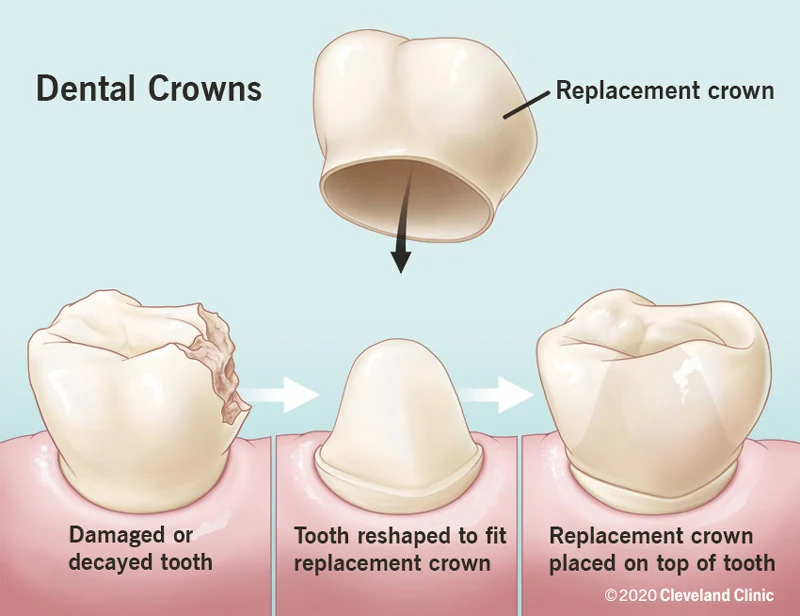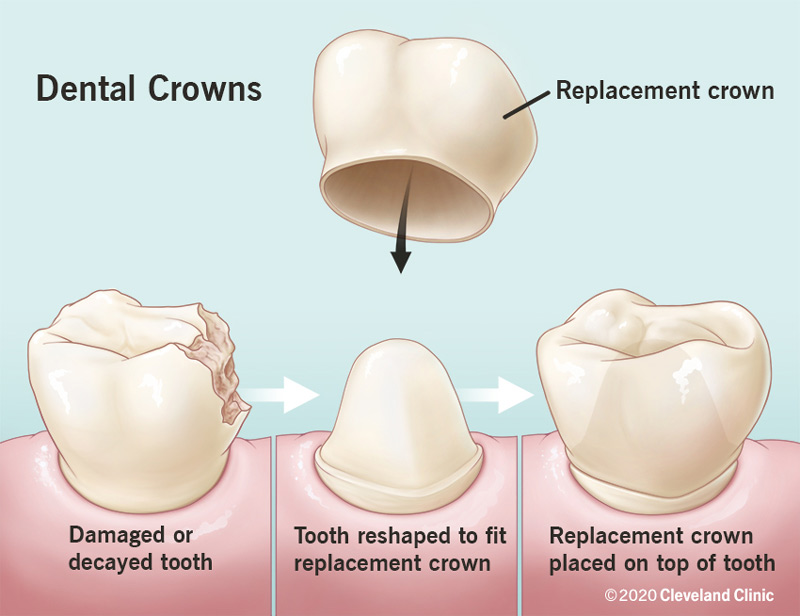
Why Are Dental Crowns Needed?
Dental crowns are a common dental treatment used to restore the shape, size, and function of a damaged tooth. They are often recommended when a tooth has suffered extensive decay, has been weakened by a large filling, or has undergone root canal treatment. Dental crowns can also be used for cosmetic purposes, such as improving the appearance of a misshapen or discolored tooth. In this article, we will explore the various reasons why dental crowns are needed and how they can benefit patients.
Restoring Damaged Teeth
Purpose of Dental Crowns
- Dental crowns are utilized when a tooth is severely damaged or decayed.
- They offer strength and protection, restoring the tooth’s function.
- Custom-made crowns cover damaged teeth completely to prevent further decay.
Ideal Situations for Crowns
- Large cavities or fractures that cannot be effectively treated with fillings or bonding.
- Particularly useful for front teeth due to their visibility when smiling or speaking.
Aesthetic Benefits
- Dental crowns not only restore function but also enhance the appearance of damaged teeth.
- Customization to match the color and shape of surrounding natural teeth for a seamless smile.
Strengthening Weakened Teeth
Risk of Weakened Teeth
- Teeth weakened by extensive decay or large fillings are prone to fracturing or breaking.
- Dental crowns provide support and stability, protecting weakened teeth from damage.
Post-Root Canal Treatment
- Recommended after a root canal to protect the treated tooth from potential fractures.
- Ensures the long-term stability and function of the tooth.
Importance for Molars
- Crucial for molars, which endure significant forces during biting and chewing.
- Crowns help molars withstand these forces, preventing fractures.
Improving the Appearance of Teeth
Aesthetic Corrections
- Dental crowns offer cosmetic improvements for various issues.
- Corrects misshapen, discolored, or poorly aligned teeth.
Material Options
- Crowns can be made from materials such as porcelain, ceramic, or metal.
- Allows customization to match the natural color and shape of the patient’s teeth.
Brightening Discolored Teeth
- Ideal for severely discolored or stained teeth, providing a bright and uniform appearance.
Reshaping and Resizing
- Used to reshape or increase the size of misshapen or smaller teeth.
- Enhances overall symmetry and beauty of the smile.
In conclusion, dental crowns are needed for a variety of reasons, including restoring damaged teeth, strengthening weakened teeth, and improving the appearance of teeth. They provide both functional and aesthetic benefits, allowing patients to regain the full function of their teeth while enjoying an improved smile. If you have any concerns about the condition of your teeth, it is best to consult with a dental professional who can assess your specific needs and recommend the most appropriate treatment, which may include the placement of dental crowns.
Key Takeaways: Why Are Dental Crowns Needed?
- Dental crowns are needed to protect and strengthen weak or damaged teeth.
- They are often used to restore teeth after root canal treatment.
- Crowns can improve the appearance of teeth by covering stains or misshapen areas.
- They can also be used to support dental bridges, replacing missing teeth.
- Dental crowns help to restore proper chewing and biting function.
Frequently Asked Questions
What are dental crowns?
A dental crown is a tooth-shaped cap that is placed over a damaged or decayed tooth. It is designed to restore the tooth’s shape, size, strength, and appearance. Dental crowns are commonly made from materials such as porcelain, ceramic, metal, or a combination of these materials.
Crowns are custom-made to fit your tooth perfectly and are cemented into place, covering the entire visible portion of the tooth above the gum line. They provide protection and support to the underlying tooth structure.
When are dental crowns needed?
Dental crowns are needed in various situations:
1. Protection for a weak tooth: If a tooth is weakened due to extensive decay, a large filling, or a root canal treatment, a crown can provide the necessary strength and support.
2. Restoration of a broken or worn-down tooth: Crowns can rebuild and restore teeth that have been fractured or worn down due to grinding or other factors.
3. Covering a dental implant: Dental implants are artificial tooth roots that are surgically placed in the jawbone. Crowns are used to cover and replace the missing tooth on top of the implant.
4. Cosmetic purposes: Crowns can improve the appearance of teeth that are severely discolored, misshapen, or have other cosmetic issues.
5. Anchoring a dental bridge: Dental bridges are used to replace missing teeth. Crowns are used to anchor the bridge to the adjacent teeth.
How long do dental crowns last?
The lifespan of a dental crown depends on various factors, including the material used, oral hygiene practices, and the amount of wear and tear the crown is subjected to. On average, dental crowns can last between 5 to 15 years. However, with proper care and regular dental check-ups, they can last even longer.
To ensure the longevity of your dental crown, it is important to maintain good oral hygiene by brushing and flossing regularly. Avoid chewing on hard objects or using your teeth as tools, as this can cause damage to the crown. Regular dental visits will allow your dentist to monitor the condition of the crown and make any necessary adjustments or repairs.
Are there any risks or complications associated with dental crowns?
While dental crowns are generally safe and reliable, there are a few potential risks and complications to be aware of:
1. Sensitivity: Some individuals may experience temporary sensitivity to hot or cold foods and beverages after getting a dental crown. This sensitivity usually subsides within a few weeks.
2. Allergic reactions: In rare cases, individuals may have an allergic reaction to the materials used in the crown, such as metals or ceramics. If you have known allergies, it is important to inform your dentist beforehand.
3. Crown fracture or dislodgment: Although uncommon, a dental crown can chip, crack, or become loose over time. This can happen due to trauma, biting on hard objects, or natural wear and tear. If this occurs, it is important to see your dentist for evaluation and potential repair or replacement.
How is a dental crown placed?
The process of getting a dental crown usually involves two visits to the dentist:
1. Preparation: During the first visit, the dentist will prepare the tooth by removing any decay or damaged portions. The tooth will be reshaped to create space for the crown. An impression of the tooth will be taken to ensure an accurate fit of the crown.
2. Temporary crown and laboratory fabrication: While the permanent crown is being fabricated in a dental laboratory, a temporary crown will be placed over the prepared tooth to protect it. The impression of the tooth is sent to the lab, where the crown is custom-made according to the specific requirements.
3. Placement of the permanent crown: On your second visit, the temporary crown will be removed, and the permanent crown will be carefully placed and adjusted for fit and bite. Once the fit is confirmed, the crown will be permanently cemented into place.
Your dentist will provide instructions on how to care for your new crown and may schedule a follow-up appointment to ensure everything is functioning properly.
Dental Crown Procedure
Final Summary: Why are Dental Crowns Essential for a Healthy Smile
Dental crowns are important for a healthy smile because they offer both functional and aesthetic benefits. These custom-made restorations cover damaged or weakened teeth, preventing further issues and providing stability. They allow comfortable biting and chewing, and also enhance the appearance of your smile by matching the color and shape of your natural teeth. In summary, dental crowns are a crucial part of maintaining a strong and attractive smile, offering both protection and cosmetic improvement. If you have dental concerns, consider consulting with your dentist to explore the benefits of dental crowns.
Call or Book appointment online
:Ace Dental Care Alpharetta office: 678-562-1555 - Book Now
Ace Dental Care Norcross office: 770-806-1255 - Book Now
Disclaimer
This blog post was generated by artificial intelligence. The content of this post may not be accurate or complete, and should not be relied upon as a substitute for professional advice. If you have any questions about the content of this post, please contact us.
We are constantly working to improve the accuracy and quality of our AI-generated content. However, there may still be errors or inaccuracies. We apologize for any inconvenience this may cause.






